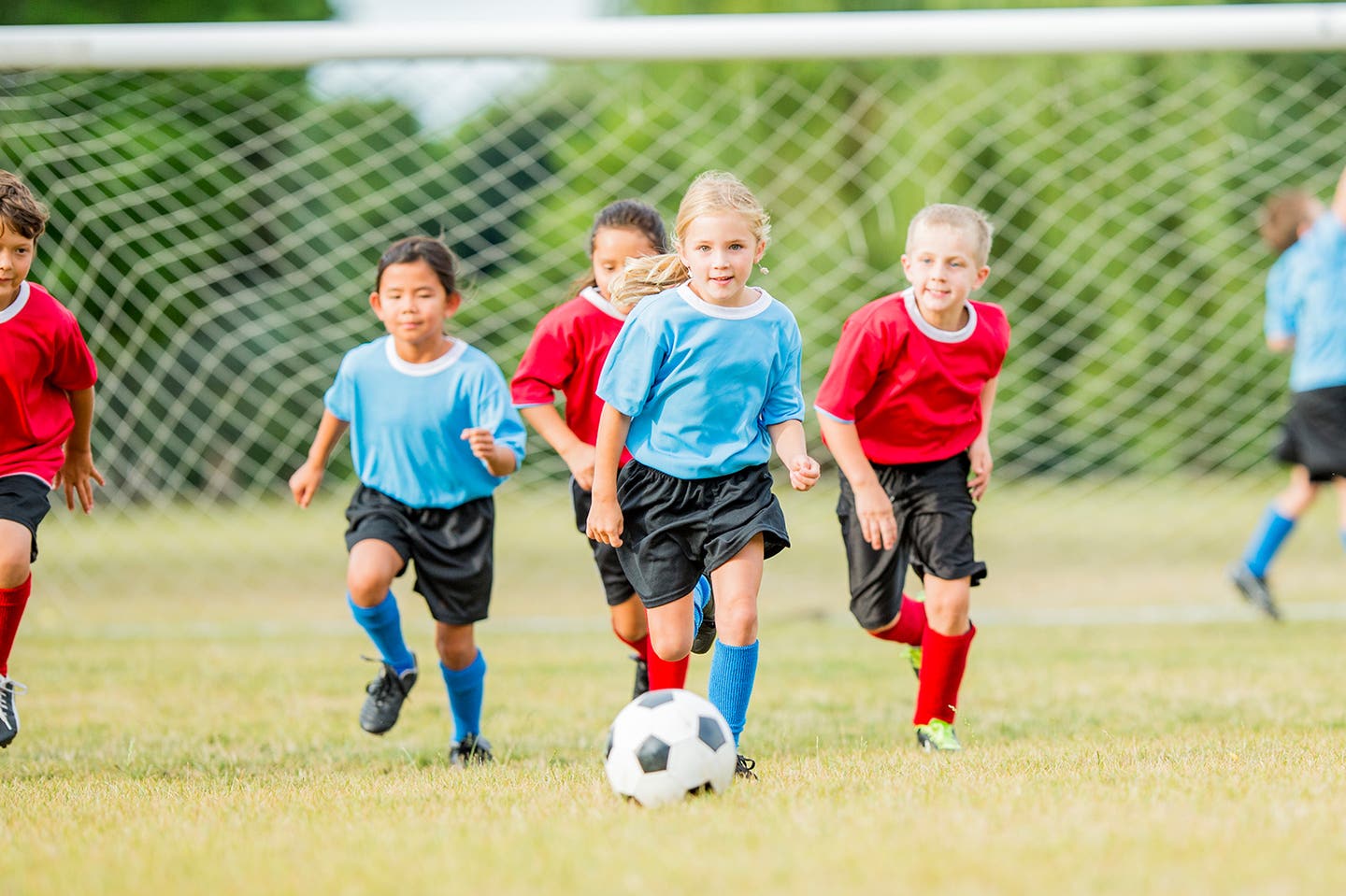These 2 activities can help you raise smarter kids, study finds
Neuroscientists from the University of Eastern Finland delved into a comprehensive two-year investigation involving 504 children.

[Aug 28, 2022: Staff Writer, The Brighter Side of News]
The children who dedicated more time to reading and participating in organized sports displayed notably enhanced thinking skills in comparison to their peers. (CREDIT: Creative Commons)
In the ever-evolving quest to understand the best ways to boost cognitive development in children, a new study has brought to light the importance of organized sports, reading, and a balanced diet. While we've long grappled with the question of screens' impact on young minds, the research from the University of Eastern Finland adds significant clarity to the conversation.
Neuroscientists from the University of Eastern Finland delved into a comprehensive two-year investigation involving 504 children aged between 6 and 9. Their findings, recently detailed in a peer-reviewed publication, revealed intriguing patterns in cognitive development.
The children who dedicated more time to reading and participating in organized sports displayed notably enhanced thinking skills in comparison to their peers. The counterparts, who mainly invested time in activities like unsupervised computer usage or unstructured free play, did not show similar cognitive advancements.
Significantly, the research underscored the efficacy of a blend of increased reading, sports, and a balanced diet — specifically, a traditional Nordic diet rich in low-fat dairy products and limited in red meats or sausages.
Related Stories:
The neuroscientists stated, "Improved diet quality and increased organized sports and reading were associated with improved cognition."
The Power of Structured Physical Activity
A striking component of the study underscores the cognitive benefits of structured physical activity, like organized sports. This observation isn't standalone; it’s buttressed by a wealth of existing research which has highlighted the strong correlation between augmented physical activity and a bolstered brain function encompassing facets like memory and learning capacity.
There's a broader dimension to this, though. Data from the National Institutes of Health elucidate that children participating in youth sports often experience elevated self-esteem and exhibit lower incidences of conditions like anxiety and depression. Particularly, team sports are a conduit for combining the vitality of physical activity with the indispensable aspect of social development.
A striking component of the study underscores the cognitive benefits of structured physical activity, like organized sports. (CREDIT: Creative Commons)
However, balance is pivotal. While structured activities have their merits in targeted learning, experts champion a mix with unstructured play, the latter vital for enhancing creativity and cultivating self-motivation.
The Age-Old Debate: Books vs. Video Games
Expectedly, the study reiterated the cognitive benefits of reading. An earlier study from the University of Cambridge established that recreational reading has strong associations with improved mental health, creativity, and reasoning skills in children. Children entrenched in reading routinely have an edge in cognitive tests over those who trade reading hours for screen time, as documented by the Cincinnati Children’s Hospital.
Children who begin reading for pleasure early in life tend to perform better at cognitive tests and have better mental health when they enter adolescence, a study of more than 10,000 young adolescents in the US has found. (CREDIT: Creative Commons)
Screen time, particularly video games, isn’t universally detrimental. The American Psychological Association points out the multifaceted benefits video games confer — from enhancing memory and spatial awareness to fostering social skills when played collectively.
However, a crucial nuance emerged from the study at the University of Eastern Finland. Unsupervised screen time appears to be the impediment. An environment devoid of oversight often witnesses increased toxic behavior and harassment, especially in the context of social video gaming.
Navigating the Digital Age: A Gentle Approach
Parents often grapple with strategies to divert their children from screens to books or physical activities. Experts advocate a transparent and gentle methodology.
Clinical neuroscientist Dr. Caroline Leaf, in a recent interview with CNBC Make It, emphasized the pitfalls of phrases like "because I said so." Instead, she recommends leveraging these instances to elucidate the long-term cognitive advantages of activities like reading or team sports.
Significantly, the research underscored the efficacy of a blend of increased reading, sports, and a balanced diet — specifically, a traditional Nordic diet rich in low-fat dairy products and limited in red meats or sausages. (CREDIT: Creative Commons)
In a rapidly digitizing era, understanding the balance between the digital and the tangible becomes pivotal. While the landscape of cognitive development will continue to evolve, this study acts as a beacon for parents navigating the maze of modern child-rearing.
Keywords: Cognitive Development, University of Eastern Finland, Organized Sports, Reading, Children's Health, Nordic Diet, Neuroscientists, National Institutes of Health, Video Games, Mental Health, Screen Time, American Psychological Association, Dr. Caroline Leaf, Cincinnati Children's Hospital, University of Cambridge.
Researchers adopted the view that ‘organized youth sport’ encompasses both child and adolescent participation in organized physical activity, is generally directed by adult or youth leaders, involves rules and formal practice, and is competitive in nature. Because rates of organized youth sport participation are relatively high in some countries but inadequate in others, continued efforts to promote sport participation and determine which types of organized sport best support child and adolescent mental health are warranted.
The purpose of the study was to extend the literature by exploring the link between participation in organized sport and a comprehensive catalogue of mental health difficulties among US children and adolescents.
Previous research has consistently suggested that youth participation in organized sports might help protect against mental health difficulties. However, some studies have linked youth sports participation to worse mental health, so more detailed research is needed to determine which approaches to sports might be most beneficial.
To shed new light, Hoffmann and colleagues analyzed data on the sports habits and mental health of 11,235 kids aged 9 to 13. Parents and guardians reported on several aspects of the children’s mental health by filling out a form known as the Child Behavior Checklist.
The researchers looked for any associations between the mental health data and the kids’ sports habits, while also accounting for other factors that might impact mental health, such as household income and overall physical activity.
In line with the researchers’ expectations, the analysis showed that kids involved in team sports were less likely to have signs of anxiety, depression, withdrawal, social problems, and attention problems.
The researchers also expected individual sports to be associated with fewer mental health difficulties, even if to a lesser extent than for team sports. However, they instead found that children who exclusively played individual sports tended to have greater mental health difficulties than those who did not play sports at all. Nonetheless, for female kids, participation in both team and individual sports was associated with a lower likelihood of rule-breaking behavior than non-sports participation.
Overall, these findings add to a growing body of evidence that playing team sports is positively associated with mental health for children and adolescents. The authors suggest that further research could help clarify the link they observed between individual sports and worse mental health difficulties, and longitudinal observations are needed to investigate any causal relationships between sport participation and mental health.
The authors add: “Children and adolescents who played exclusively team sports, like basketball or soccer, had fewer mental health difficulties than those who did not participate in any organized sports. However, to our surprise, youth who participated in only individual sports, such as gymnastics or tennis, had more mental health difficulties compared to those who did not participate in organized sports.”
Note: Materials provided above by The Brighter Side of News. Content may be edited for style and length.
Like these kind of feel good stories? Get the Brighter Side of News' newsletter.



